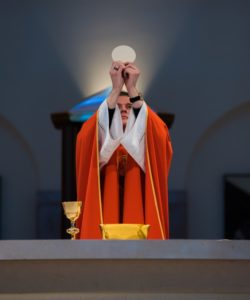By the Middle Ages, Christians were celebrating the remarkable event of Jesus’ birth with an extended season that began with Advent (four Sundays before Christmas) and continued for the 12 Days after Christmas (up until Epiphany on January 6th). The time preceding Christmas used to be a solemn time of fasting, whereas the days after Christmas were the time of celebration. Christians looked forward to the Midnight Mass of Christmas Eve with great anticipation, because the service marked the transition from fasting to feasting. This service, known as “Christ’s Mass,” eventually became a description for celebrations of Jesus’ birth worldwide. The word Christmas has its origin in the old English term Cristes Maesse, meaning “Christ’s Mass.”1

Though the word Christ is commonly used as Jesus’ name, it is actually a title. It comes from a Greek word that means “Anointed One” (the Hebrew word is “Messiah” — a term that Old Testament prophets used to describe the coming Savior). It should be noted that the abbreviated term Xmas does not necessarily take the “Christ” out of Christmas. The first letter of the Greek word for Christ (Χριστός) is “X” (pronounced “kai” in Greek), and it has been used throughout history to represent Jesus’ title.
Mass comes from the Latin word missa, which means “dismissal.” During the Middle Ages, the term became a general description of the Eucharistic service (the bread and wine of which Christians partook in remembrance of the body and blood of Jesus).2 The word gives insight into how medieval Christians understood at least one of the significant aspects of the Eucharist — they gathered together to remember the body (and great sacrifice of Christ), so that they would be strengthened to go (or more specifically, be “dismissed”) back into the world to BE the body of Christ.
The apostle Paul told of this mystery when he wrote to believers in Corinth, “Now you are the body of Christ, and each of you is a part of it” (1 Corinthians 12:27).
And no, Christmas is not a pagan holiday
FOOTNOTES:
1 Martindale, C. Charles. “Christmas.” The Catholic Encyclopedia. Robert Appleton Company, 1908. Retrieved July 20, 2008 from New Advent: http://www.newadvent.org/cathen/03724b.htm.
2 Pohle, Joseph. “Sacrifice of the Mass.” The Catholic Encyclopedia. Robert Appleton Company, 1911. Retrieved July 20, 2008 from New Advent: http://www.newadvent.org/cathen/10006a.htm.
Image Credit: Definition of “Christ” from Merriam-Webster.
Originally published in https://www.celebratingholidays.com/?page_id=996

Pingback: Christmas Is Not A Pagan Holiday | Why Catholic
Pingback: ruger firearms online store merchandise